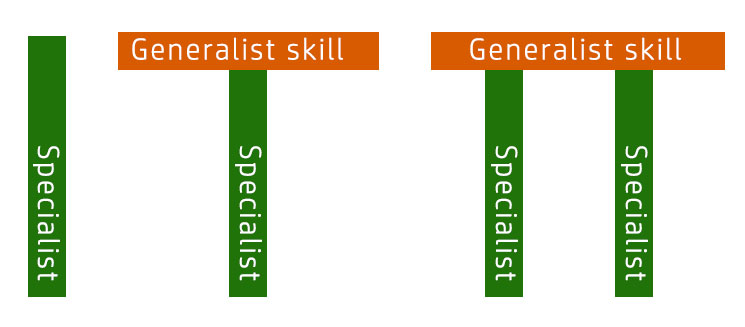UX (Design) is a bigger umbrella and it’s getting broader. Design is not limited to a defined skillset; ideally a designer gets involved in an abstraction face of a product, where product is a vague thought of a client. It has to be materialized on web or in other accessible platform.
Between the abstractions to materialization face; a designer has to work in a multiple areas such as understanding business requirement, analysing user research, user testing, creating wireframe mock-ups, visual design, high fidelity front end prototype etc.
To complete a project/product different people with different expertise works. User research specialist, Usability specialist, Visual Designer and Front end developer. Of Course one person cannot have expertise in all the fields.
Should a designer be generalist, specialist or unicorn skillset?

Generic categorization of skillset
Dash(-) shape skillset: I am having some general knowledge about everything.
I-shaped skillset: I am highly versed in a specific area.
T-shaped skillset: I am extremely good in one area but have generalist skillset in other.
The vertical bar on the “T” represents expertise area and dash(-) or horizontal line above “T” represent general contextual skillsets. So, “T” is a combination of I and “-”
Pi-shaped skillset: I am specialist in two or more area and generalist in other contextual skillset.
Importance of different skillset in a project
Different skillset person have their own importance in the project. Generalist skillset person improves team’s work velocity. I-shaped skillset overlap their expertise with generalist and T-shaped or Pi-shaped skillset bridge the gap between different team and people of different fields. Having different types of skillset in the team, a manager can swap designers as and when deadlines and priorities changes.
I-shaped skillset in an agile environment
I-shaped skill may be highly important and paid very well (if that specialize skill is in high demand but has rare supply). In an agile environment design and development has to be cross-functional and all members need to have some specific skill and general competencies of others to work together efficiently.
Innovation and I-shaped skillset
Desirability, Feasibility and Viability are the three pillars of an innovation. A designer proposing design solution without considering the technical feasibility of implementation will lead to nothing or rework. Overlapping with different team and knowing contextual skillset is very important for a designer.
Becoming a specialist in one skill is important but learning a new skill doesn’t make other skill any less important, because skills are not mutually exclusive. It adds value to the core skill.
Importance of moving from dash or “I” to “T” or “Pi” skillset
“I” is something one is talented and passionate about and always keeps on pushing the limits to constantly improve in one area. But interdisciplinary skills adds feather on the crown. For example, designer specialist in User research but generalist in variety of other skills likes wire-framing, designing, front-end-development. It will have biggest competitive advantage.
Good article Gopal bhai 🙂
In my opinion, its better to think as a generalist, and deliver as a specialist. If starting ones career, one should start off as a Generalist, and later move on to be a Specialist. If you need to keep moving, you should always keep your options handy. So being a specialist, its best to remain mobile. You need to keep that one end open and moving. One major issue of being a specialist in one field is of being “Typecast”. People tend to think that you are good for this role only, and that totally is up to you…how you gonna take it, “as a compliment or as criticism“
Well said Sushant!!!
In career path one should always be progressive; generalist skill plays vital role in the career. It’s a volatile industry; I have seen people specialist in Flash Action Script loosed their job as HTML5 almost replaced it. Progressive should not only be thinking but action as well.